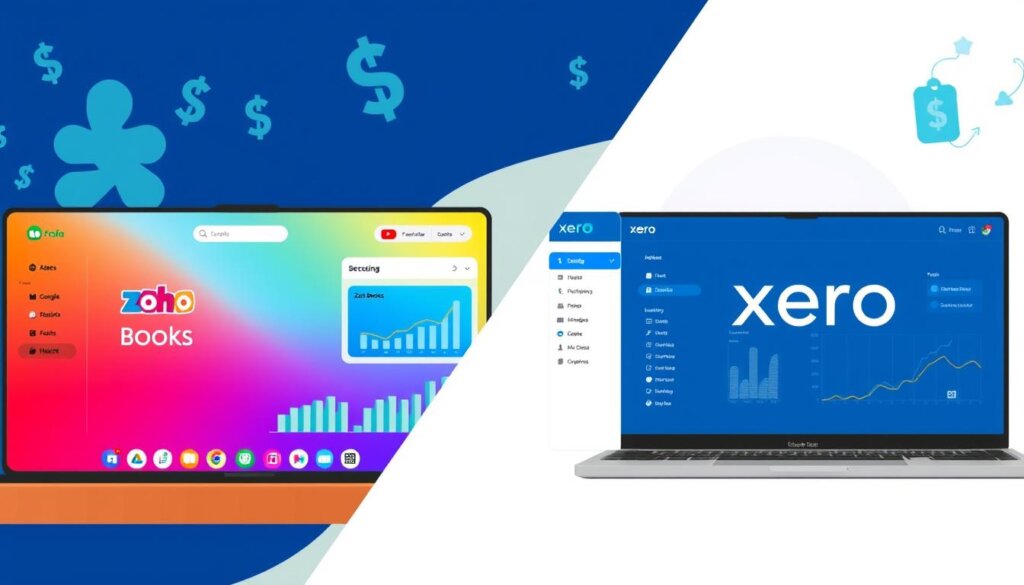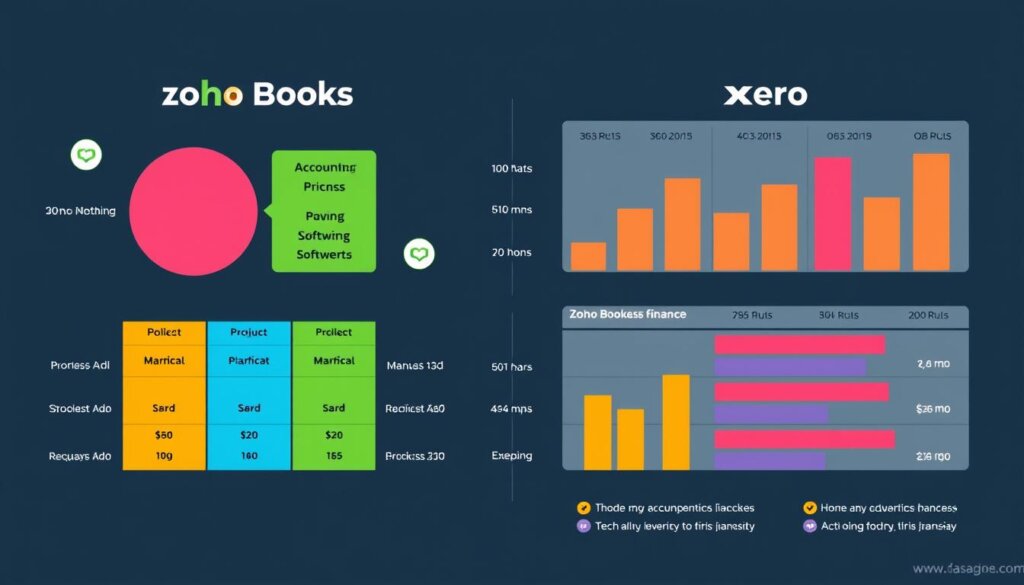In the world of small business accounting, Zoho Books and Xero are leaders. They help entrepreneurs and small business owners manage their finances. Both have great reviews, but they suit different businesses.
QuickBooks Online is also a top choice, thanks to its ProAdvisors for local help. But we’ll focus on Zoho Books and Xero. This will help you choose the best for your business.
Key Takeaways
- Zoho Books is great for managing inventory, while Xero has a fixed asset manager.
- Zoho Books has a top mobile app, and Xero lets you have unlimited users.
- Xero is best for bank reconciliations, with smart matches and auto-categorization.
- Zoho Books has a free plan, and Xero’s prices range from $0 to $275 a month.
- Both offer strong invoicing, expense tracking, and financial reports for small businesses.
Understanding Cloud-Based Accounting Solutions
https://www.youtube.com/watch?v=2U1tLmsFHr8
In today’s world, cloud-based accounting tools like Zoho Books and Xero are key for small businesses. They help manage finances well. These platforms give quick access to important financial data and make accounting easier.
One big plus of cloud-based accounting is being able to check finances from anywhere. This lets business owners and their teams keep up with invoices, expenses, and reports. It saves time and lets them focus on growing the business.
Zoho Books and Xero both have strong financial management features. They handle things like bills, money owed, budgets, and taxes. But, they have different features and prices, fitting the needs of small and medium businesses.
To really understand cloud-based accounting, it’s good to compare Zoho Books and Xero. Look at their features, ease of use, and costs. This helps businesses choose the best online bookkeeping for their financial management needs.
“Cloud-based accounting solutions have revolutionized the way small businesses manage their finances, providing them with real-time insights and streamlined processes.”
Zoho Books vs. Xero: Key Differences

When looking at Zoho Books and Xero, two top cloud-based accounting features, it’s key to know what sets them apart. They differ in core platform features, user interface, and mobile app functionality. Each has unique abilities to fit the needs of various businesses.
Core Platform Features
Both Zoho Books and Xero have a wide range of accounting tools. These include invoicing, tracking expenses, managing projects, and financial reports. Zoho Books has advanced inventory features like FIFO and LIFO costing. Xero only supports FIFO.
Xero has a fixed asset manager module, but Zoho Books does not.
User Interface and Experience
The user interface and experience are different between the two. Xero is known for its modern design and customizable dashboard. It gives a quick financial overview.
Zoho Books has a more traditional look but is still easy to use for accounting tasks.
Mobile App Functionality
Zoho Books is seen as the top choice for mobile accounting. Its app is great for invoicing, bank reconciliation, and tracking expenses on the go. Xero’s app is functional but not as strong as Zoho Books’.
In summary, Zoho Books and Xero share many features but differ in inventory management, fixed asset tracking, user interface, and mobile app functionality. Businesses should think about their specific needs to choose the best platform for them.
| Feature | Zoho Books | Xero |
|---|---|---|
| Inventory Management | Supports FIFO and LIFO costing methods | Supports FIFO costing method only |
| Fixed Asset Management | No fixed asset manager module | Offers a fixed asset manager module |
| User Interface | Traditional interface design | Sleek and modern interface with customizable dashboard |
| Mobile App Functionality | Praised for best-in-class mobile app | Mobile app is considered weaker compared to Zoho Books |
The choice between Zoho Books and Xero depends on your business’s needs and preferences. Both offer strong accounting features to help manage finances.
Pricing Structure and Plans Comparison

When choosing accounting software, price is a big deal. Zoho Books and Xero have plans for all kinds of businesses. They offer different options to fit your budget and needs.
Zoho Books has a free plan for small businesses. Their paid plans cost between $20 and $275 a month. You can add more users for $2.50 each, but the Ultimate plan only supports 15 users. On the other hand, Xero lets you have unlimited users on all plans.
Xero plans cost between $20 and $80 a month. The Established plan at $62 a month has lots of features. It also supports over 160 currencies and has project management tools, great for growing businesses.
Both Zoho Books and Xero offer free trials. Zoho Books has a 14-day trial, while Xero gives you 30 days. This lets you try before you buy.
| Pricing Comparison | Zoho Books | Xero |
|---|---|---|
| Free Plan | Yes, for businesses with less than $50,000 annual revenue | Yes, for all users |
| Paid Plan Pricing Range | $20 to $275 per month | $20 to $80 per month |
| Maximum Users | 15 users on the Ultimate plan | Unlimited users across all plans |
| Free Trial Period | 14 days | 30 days |
In summary, Zoho Books and Xero have good prices and plans for all businesses. The best choice depends on your specific needs. Also, consider the free trial that fits your evaluation best.
User Management and Access Control

Zoho Books and Xero both have great features for managing users and access. Zoho Books is great for small and medium-sized businesses. It lets you set up roles for different team members.
Team Collaboration Features
Zoho Books makes it easy for your team to work together. You can share documents and leave comments in real-time. This helps your team work better, no matter where they are.
Role-Based Permissions
Zoho Books lets you give specific roles to your team. Roles like “Accountant” or “Manager” come with certain permissions. This keeps your data safe and makes sure only the right people can see it.
Multi-User Support
Xero is good for big teams because it supports unlimited users. This makes it easy for your team to grow and work together. Xero is great for big businesses that need lots of help with money and reports.
| Feature | Zoho Books | Xero |
|---|---|---|
| User Management | Role-based permissions, up to 15 users on top plan | Unlimited users across all plans |
| Team Collaboration | Shared documents, real-time comments, task assignments | Shared dashboards, centralized document storage, task management |
| Scalability | Suitable for SMEs, additional users incur extra cost | Ideal for larger businesses with growing accounting teams |
Both Zoho Books and Xero have strong features for managing users and access. They meet the needs of different-sized businesses. The right choice depends on your business’s size and growth plans.
Invoice Management and Customization

Invoicing is key for any business. Zoho Books and Xero both have great invoicing tools. They help make this process easier.
Zoho Books lets you design invoices with your own style. You can pick colors, fonts, and layouts. This makes your invoices look unique and professional.
Xero focuses on making invoicing easy and fast. It has a simple interface and lets you create recurring invoices. While it doesn’t have as many design options as Zoho Books, it saves time.
| Feature | Zoho Books | Xero |
|---|---|---|
| Invoice Customization | Extensive customization options, including colors, fonts, and layouts. | Functional invoicing with fewer customization options. |
| Recurring Invoices | Offers recurring invoice features. | Offers recurring invoice features. |
| Multicurrency Support | Supports multiple currencies. | Supports multiple currencies. |
Choosing between Zoho Books and Xero depends on your business needs. Zoho Books might be better if you want to customize invoices a lot. Xero could be the way to go for a simple invoicing process.
“Invoicing is the lifeblood of any business, and having the right invoicing software can make all the difference in getting paid on time and maintaining a professional image.”
Expense Tracking and Management Features
![]()
Managing expenses is tough for small businesses. But cloud-based platforms like Zoho Books and Xero make it easier. They offer great tools for expense tracking, receipt scanning, and reimbursement.
Receipt Scanning Capabilities
Zoho Books charges for automated receipt scans. But, Xero includes this in its plans. This lets businesses quickly capture and sort expenses by taking photos of receipts.
Expense Categories and Rules
Zoho Books and Xero let you set up your own expense categories and rules. This makes sure expenses are tracked right. It helps businesses keep track of their spending and make smart money choices.
Reimbursement Processing
The platforms also make it easy to process reimbursements. Employees can send in expense claims and get quick approvals and payments. This makes managing expenses easier for everyone in the company.
Zoho Books and Xero have everything small and medium-sized businesses need for expense tracking. They help businesses control their finances better and make better choices.
Bank Reconciliation and Integration

Keeping your financial records accurate is key for your business’s health. Zoho Books and Xero both have great bank reconciliation tools. They make it easy to match transactions and keep your finances in order.
Xero has more advanced features like suggested matches and bulk reconciliation. This makes reconciling easier and less prone to mistakes. Zoho Books, on the other hand, is simpler but still effective. It’s great for those who like easy-to-use tools.
| Feature | Zoho Books | Xero |
|---|---|---|
| Bank Feeds | ✓ | ✓ |
| Automated Transaction Categorization | ✓ | ✓ |
| Suggested Matches | – | ✓ |
| Bulk Reconciliation | – | ✓ |
Zoho Books and Xero both let you link your bank and credit card accounts. This makes it easier to keep your finances up to date. It saves you time and effort.
Choosing between Zoho Books and Xero depends on your business’s needs. Think about how complex your finances are and how much automation you need. Also, consider how easy the tools are to use.
Inventory Management Capabilities

Zoho Books is great for managing inventory. It has features like tracking serial numbers, batches, and shipments. This is key for businesses that need to keep a close eye on their stock.
Zoho Books lets you choose how to value your inventory. You can use FIFO or LIFO. Xero only supports FIFO, which limits its options.
Warehouse Management
Zoho Books also helps manage warehouses. It lets businesses track stock in different places and move goods efficiently. Xero doesn’t have tools for warehouse management, which is a big drawback for complex inventory needs.
Stock Tracking Features
- Serial number tracking
- Batch tracking
- Shipment tracking
Inventory Valuation Methods
| Feature | Zoho Books | Xero |
|---|---|---|
| FIFO (First-In, First-Out) | ✓ | ✓ |
| LIFO (Last-In, First-Out) | ✓ | – |
Zoho Books is better than Xero for managing inventory. It offers advanced tracking, multiple valuation methods, and strong warehouse management. Businesses with complex inventory needs should choose Zoho Books.
Project Accounting and Time Tracking
Zoho Books and Xero both have great features for project accounting and time tracking. They are perfect for businesses that bill clients based on time. This is key for freelancers and firms that manage projects.
Xero stands out because it lets you compare actual costs to what you expected. This helps you see if a project is making money. Zoho Books also tracks projects well, but it doesn’t compare costs like Xero does.
Both Zoho Books and Xero make it easy to track hours and add them to invoices. This helps with accurate billing and managing projects. Xero also gives a better look at how profitable a project is.
Zoho Books and Xero are both great for managing projects and tracking costs. The choice depends on what your business needs most.
| Feature | Zoho Books | Xero |
|---|---|---|
| Project Accounting | Robust project accounting features | Robust project accounting features, with the ability to compare actual to estimated labor and inventory costs |
| Time Tracking | Comprehensive time tracking capabilities, including the ability to add billable hours to invoices | Comprehensive time tracking capabilities, including the ability to add billable hours to invoices, with project profitability estimates |
| Pricing | Zoho Books Standard plan starts at $15 per month | Xero Early plan starts at $20 per month |
Reporting and Analytics Tools
Zoho Books and Xero have great tools for financial reporting and business analytics. They help small and medium-sized businesses understand their finances better. This way, they can make smart decisions based on data.
Custom Report Building
Xero is great because it lets you make unlimited custom reports. This means you can create reports that fit your business perfectly. Zoho Books, on the other hand, only lets you make custom reports in its higher plans. This limits options for smaller businesses.
Financial Dashboard Options
Both Zoho Books and Xero have detailed financial dashboards. But Zoho Books shows more about payables and receivables right on the dashboard. This helps users quickly see their financial situation.
In summary, Xero and Zoho Books have strong tools for financial reporting and business analytics. Xero’s unlimited custom reports are perfect for businesses needing detailed reports. Zoho Books’ dashboards are easy to use and great for keeping track of finances.
Third-Party Integrations and API Access
Zoho Books and Xero are great at working with many third-party software solutions. Zoho Books works well with other Zoho products. Xero, on the other hand, has over 1,000 third-party app integrations. This makes Xero better for businesses because it uses many different software tools.
Both platforms let businesses connect their favorite systems and tools. This is key for today’s businesses that use many apps to run their operations.
- Xero has a huge app marketplace with over 1,000 integrations. These cover many business areas, like CRM, payroll, and e-commerce.
- Zoho Books has fewer third-party integrations, but it works well with other Zoho products, which is good for businesses already using Zoho.
- Both platforms offer strong API access. This lets businesses create custom integrations and adjust their accounting workflows as needed.
The choice between Zoho Books and Xero depends on a business’s software needs. Businesses needing lots of third-party software integrations might choose Xero. Zoho Books could be better for businesses already using Zoho products.
Customer Support and Resources
Zoho Books shines in customer support and resources. It offers many ways to get help, like email, phone, live chat, and a chatbot. This means users can easily find support. Xero also has email support and a chatbot, but it focuses more on self-help.
Zoho Books and Xero have a large knowledge base and active user groups. But Zoho Books’ direct support channels are a big plus. They are great for those who want quick help or need personal assistance.
“Zoho Books’ support team has been incredibly responsive and helpful in resolving any questions or concerns I’ve had. Their commitment to customer satisfaction is truly impressive.”
Zoho Books also offers many educational tools, including video tutorials, webinars, and a detailed user guide. These make it easy for users to learn the platform’s features.
- Zoho Books offers email, phone, live chat, and chatbot support options for customer assistance.
- Xero mainly has email support and a chatbot with some self-help resources.
- Both platforms have a large knowledge base and active user communities.
- Zoho Books’ direct support channels give it an edge in personal help and quick solutions.
- Zoho Books has many educational resources, like video tutorials, webinars, and a user guide.
In summary, Zoho Books is a top pick for businesses. It offers detailed customer support and resources. This makes it a great choice for those who want a more personal and hands-on accounting software experience.
Security Features and Data Protection
Zoho Books and Xero focus on keeping your financial data safe. They use top encryption to protect your business info. Both platforms have strong security to keep your financial records safe.
Encryption Standards
Zoho Books and Xero use strong encryption. They use 256-bit SSL/TLS encryption to keep your data safe online. This encryption is top-notch, keeping your data safe from hackers.
Backup Solutions
Zoho Books and Xero have automatic backups. They keep your financial data safe, so you can relax. If something goes wrong, you can quickly get back to work.
Compliance Measures
Both platforms follow strict rules like GAAP, IFRS, and HIPAA. This shows they care about your data and follow the law. You can be sure your financial info is in good hands.
FAQ
What are the key differences between Zoho Books and Xero?
What features do cloud-based accounting solutions like Zoho Books and Xero offer?
How do Zoho Books and Xero differ in their inventory management capabilities?
What are the pricing structures and plan options for Zoho Books and Xero?
How do Zoho Books and Xero differ in user management and access control features?
What are the key differences between Zoho Books and Xero in invoice management and customization?
How do Zoho Books and Xero compare in terms of their expense-tracking features?
What are the differences in bank reconciliation capabilities between Zoho Books and Xero?
How do Zoho Books and Xero stack up in their project accounting and time-tracking features?
What are the differences in reporting and analytics tools between Zoho Books and Xero?
How do the customer support and resources differ between Zoho Books and Xero?
What security features and data protection measures do Zoho Books and Xero offer?
Thomas Steven is a 15 Years of experience digital marketing expert. He covers all things tech, with an obsession for unbiased news, reviews of tech products, and affiliate deals. With his experience, Thomas helps consumers choose what and how to buy from evaluating products by features, ease-of-use, cost-effectiveness or customer care allowing them to make intelligent purchasing decisions in the dynamic world of technology.

